Woman Wants To Rehome A Dog Her Husband Brought Home, But Doesn’t Take Care Of
Marriage, like all relationships, is all about compromise. There are certain things you have to tolerate and things your partner tolerates about you. But you have to draw a line sometimes.
When your partner’s decisions affect you in a very negative way, you have to speak up and do something about it. Bringing a pet into a home is a big decision, and both partners have to be on board.
One Redditor shared her problem:
“I, 28 Female, and my husband, 29, recently bought our first house. As a congratulatory gift, my husband's friend gifted him a 3-month-old Doberman because my husband has wanted a dog for quite some time now but was never able to get one because we couldn't have pets where we used to live.”
Now, a living and breathing creature is a great gift when it is well planned and you know that it will be well received by the other party. But this wasn’t the case.
“Admittedly, I was really on the fence when he brought her home because I work 12-14 hour shifts at a really understaffed dialysis clinic, and although my husband works from home, he's constantly in and out of meetings. He assured me that none of that would be a problem, but here we are, 3 months later, and it has been a massive problem.”
So, OP is doing all the work, and the husband is slacking. She talked to him a couple of times, but with no results. Now she wants to do something radical.
OP asks:

She and her husband bought their first house. And his friend gave him a Doberman puppy as a housewarming gift.
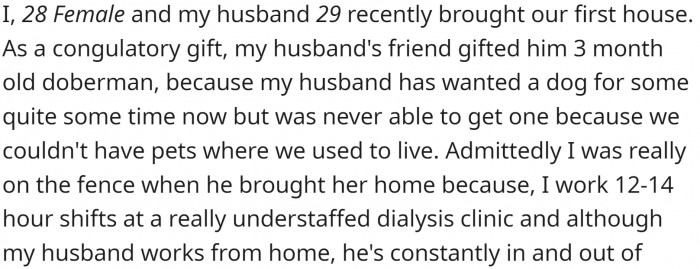
OP wasn't thrilled about the gift, but her husband promised to take care of the puppy. But that's not what's happening

Understanding Attachment Styles
Dr. Mary Main, a leading researcher in attachment theory, emphasizes the importance of understanding how attachment styles developed in childhood can influence adult relationships.
This situation showcases potential avoidant attachment behaviors, where one partner may idealize the concept of pet ownership without recognizing the emotional labor involved.
Attachment theory suggests that individuals with avoidant styles may struggle with commitment and responsibility in relationships, often leading to conflicts when expectations are not aligned.
Understanding the Dynamics of Pet Ownership
The psychology of pet ownership reveals complex dynamics, particularly when one partner is enthusiastic while the other is hesitant. According to Dr. Laura Berman, a renowned sex therapist, "Pets can enhance emotional well-being, but they require shared responsibility and commitment from all family members." This sentiment is echoed by Dr. Michele Gelfand, a cultural psychologist, who states, "Pets can serve as emotional support, yet they also demand attention and care, which can lead to conflict if not equally shared." In this case, the husband's romanticized view of dog ownership may have overshadowed the practical responsibilities that accompany it. It's essential to acknowledge that while pets can bring joy, they also require a serious commitment that needs to be agreed upon by all involved.
OP is tired of having to take care of the dog that she didn't even want. She loves the dog, and she believes that it deserves a family that can take care of it properly. Her husband doesn't even want to hear about rehoming
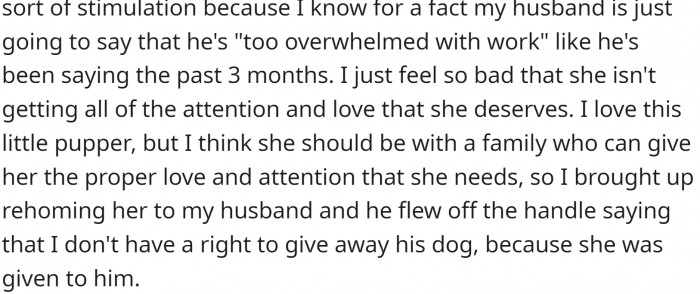
OP found a wonderful home for the puppy and wants to give it away without her husband knowing

Redditors say - it is a minefield
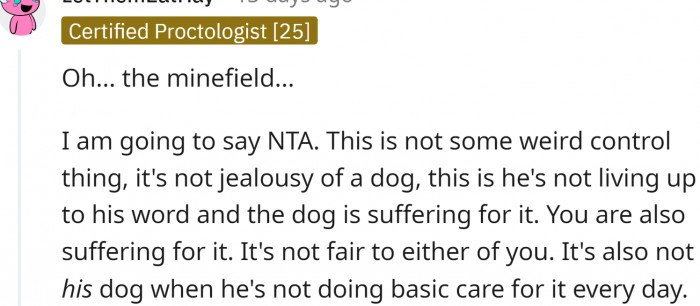
The notion that 'dogs aren't ornamental' resonates with psychological insights from behavioral science, which suggest that pet ownership requires emotional investment and consistent care.
Research published in the Journal of Personality and Social Psychology indicates that individuals who fail to engage in caregiving behaviors may experience feelings of guilt or resentment, particularly when others perceive them as neglectful.
This situation can exacerbate feelings of frustration and disappointment, leading to a breakdown in communication between partners.
According to Dr. Emily Roberts, a clinical psychologist, the tendency to idealize pet ownership often stems from societal pressures and personal desires for companionship. This can lead to a disconnect between expectations and reality, causing stress and resentment. In relationships, such discrepancies can trigger deeper issues related to communication and shared values.
Moreover, the division of responsibilities surrounding a pet can mirror broader relationship dynamics, where one partner may feel overwhelmed by caregiving while the other remains disengaged.
It is technically her dog
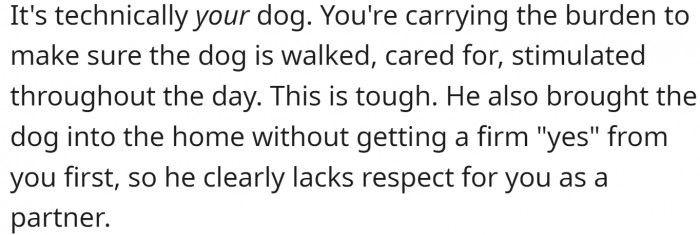
Dogs are not ornaments

One Redditor shared how she handled a similar situation:

The Psychology of Responsibility in Relationships
Studies show that shared responsibilities produce a sense of partnership in relationships, which is crucial for long-term satisfaction.
The imbalance in pet care can lead to feelings of resentment, as one partner may feel they are disproportionately shouldering the emotional and physical burden of pet ownership.
Addressing this imbalance through open communication can foster a more equitable relationship dynamic.
The Importance of Open Communication
Effective communication is crucial in resolving conflicts over pet ownership. Research in relational psychology indicates that when couples openly discuss their feelings and expectations, they can avoid misunderstandings and resentment. Studies suggest that couples who practice active listening and empathetic communication tend to have more harmonious relationships.
Encouraging each partner to express their concerns about the dog's care can foster understanding and lead to practical solutions, such as dividing responsibilities or seeking external help, like dog walkers or trainers, to alleviate the burden.
OP should be careful
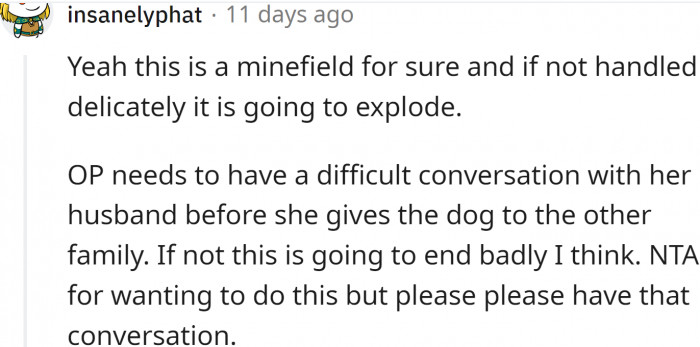
One thing to try:
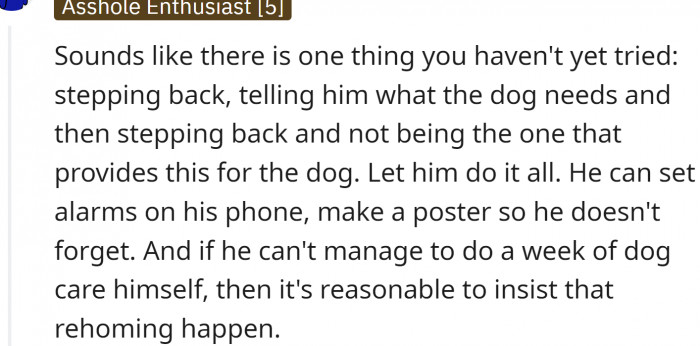
The dog will suffer

Practical recommendations for this couple include setting a designated time to discuss pet care responsibilities openly.
According to relationship experts, creating shared agreements about pet care can significantly reduce conflict and promote mutual understanding.
Additionally, both partners should explore their feelings about pet ownership to ensure that both individuals are on the same page regarding their responsibilities.
From a behavioral perspective, the husband's reluctance to take responsibility for the dog may reflect deeper issues, such as avoidance of commitment or fear of responsibility. Psychologists note that these behaviors often manifest in various forms, especially when individuals struggle with their roles within relationships.
Identifying these patterns can be the first step toward addressing underlying conflicts. Couples therapy can provide a safe space to explore these dynamics and develop strategies for collaboration in pet care.
She should contact the person who gave them the dog first

This is sad:
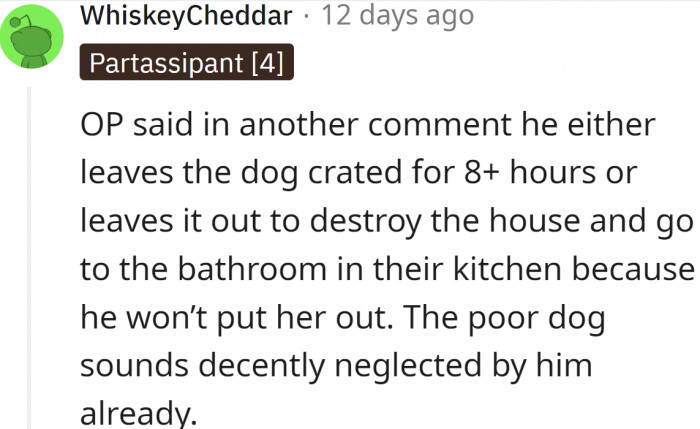
That friend didn't think it through...
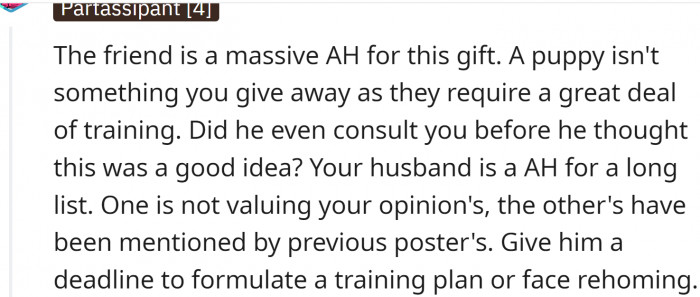
Exploring Motivations Behind Pet Ownership
Psychologists have noted that motivations for pet ownership vary widely, influenced by personal, cultural, and societal factors.
While one partner may see the dog as a source of companionship, the other may view it as an obligation, leading to misunderstandings.
Understanding these differing motivations can help partners negotiate their roles more effectively and create a shared vision for pet care.
Practical Solutions for Shared Responsibilities
To navigate this situation, couples could benefit from establishing a clear pet care schedule. Research shows that structured plans can enhance accountability and reduce conflict. For instance, creating a weekly chart that outlines feeding, walking, and vet responsibilities can help ensure that both partners are actively involved.
Additionally, involving a third party, such as a pet trainer, can provide not only guidance for training but also a neutral perspective on shared responsibilities. This approach can help couples align their expectations and foster teamwork.
OP says:

it is time...

No more second chances
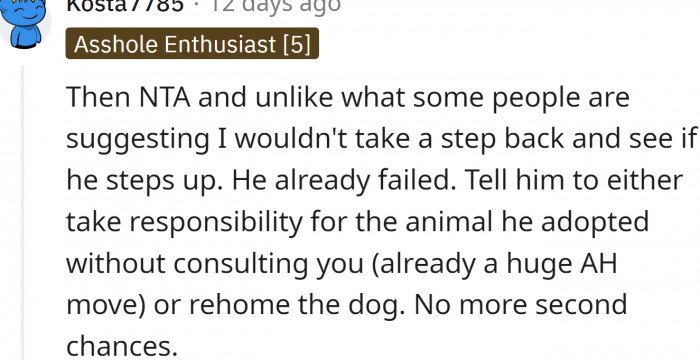
Emotional intelligence plays a crucial role in navigating relationship conflicts, especially regarding shared responsibilities.
According to Dr. Daniel Goleman, an emotional intelligence expert, "The ability to understand and manage your own emotions, as well as those of others, is essential for effective communication." Developing emotional awareness and empathy can lead to healthier communication strategies. Encouraging both partners to express their feelings about pet ownership can facilitate understanding and connection.
It's also worth noting that feelings of resentment can build over time if one partner feels their needs are unmet. A study in the Journal of Family Psychology highlights that unmet needs in relationships can lead to increased dissatisfaction and conflict. Therefore, regular check-ins about each other's feelings regarding pet care can preemptively address growing tensions.
These discussions should be framed positively, focusing on appreciation for each other's contributions rather than grievances.
OP shouldn't act before informing her husband
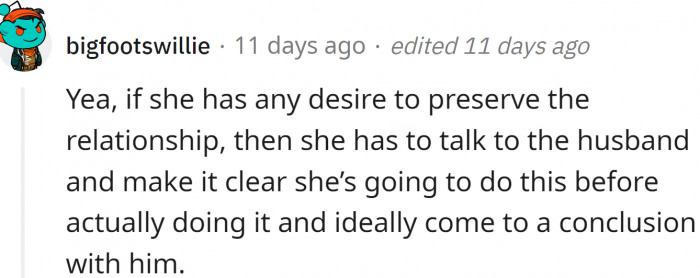
Because...

OP says:
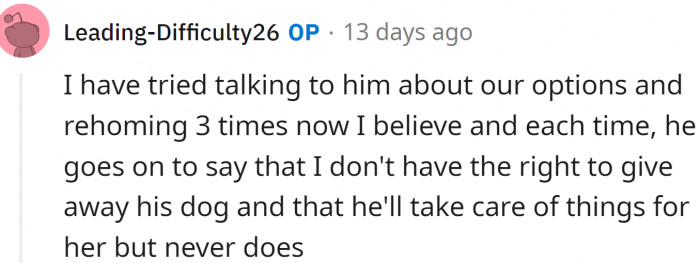
The Role of Compromise in Relationships
Compromise is essential in any relationship, particularly when it comes to shared responsibilities like pet care.
Psychological research indicates that successful compromise occurs when both partners feel heard and valued, leading to improved relationship satisfaction.
Implementing a trial period where both partners share responsibilities can help gauge what works best for each individual.
Exploring the Emotional Impact of Pets
Pets undoubtedly affect our emotional landscape, serving as sources of joy, companionship, and even stress. According to research published in the Journal of Applied Animal Welfare Science, while pets can enhance our mental health, the responsibility of care can also lead to stress if not shared. This dynamic is particularly relevant in situations where one partner feels overwhelmed.
Encouraging open dialogue about the emotional impact of pet care can help both partners understand each other's perspectives and find common ground.
We feel sorry for the OP because she is walking on a minefield here. She is simply trying to do what’s best for the dog.
“Although this little puppy is the sweetest and extremely smart, she's a six-month-old puppy...she's super energetic and needs constant engagement, and I've been the only one doing the best that I can.”
Her husband claims ownership but doesn’t want any responsibilities it brings. And it is not fair.
In summary, addressing the issues surrounding pet ownership in relationships requires a multifaceted approach. Couples should prioritize communication, establish shared responsibilities, and remain sensitive to each other's emotional needs. By working together, they can navigate the challenges of pet ownership while strengthening their relationship.
Ultimately, fostering a cooperative environment can transform the experience of pet ownership from a source of conflict into an opportunity for growth and connection.
Psychological Analysis
This situation illustrates common relational dynamics where one partner may be enthusiastic about a shared commitment while the other feels burdened by it. It's crucial to recognize that each person's perspective is valid and must be openly discussed to find a resolution. Regular communication about expectations and responsibilities can significantly improve the quality of the relationship.
Analysis generated by AI
Analysis & Alternative Approaches
Clinical psychologists emphasize that understanding the psychological dynamics of pet ownership can foster healthier relationships. Dr. Alexandra Solomon, a relationship therapist, states, "Empathy and open communication are essential for navigating shared responsibilities, especially when it comes to caring for pets." By addressing these issues directly, couples can cultivate a more harmonious living environment that benefits both their relationship and their pets, as highlighted on her website dralexandrasolomon.com.
Ultimately, fostering a supportive environment where both partners feel comfortable discussing their feelings about pet ownership can mitigate conflicts.
Research indicates that couples who engage in regular check-ins regarding their shared responsibilities are more likely to maintain a harmonious relationship.
Encouraging dialogue about expectations can pave the way for a healthier partnership.
Analysis & Alternative Approaches
Research from various psychological studies confirms that understanding and addressing differing expectations in relationships is crucial for maintaining harmony.
As noted in relationship psychology literature: 'Effective communication can bridge gaps in understanding and promote a healthier partnership.'



